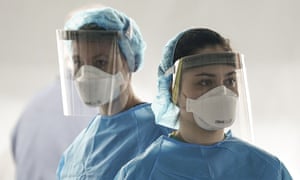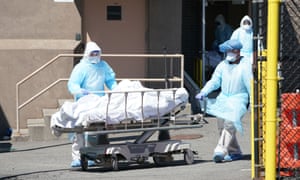Who gets a ventilator? The ‘gut-wrenching’ choices facing US health workers
Under unprecedented circumstance, and in the absence of federal guidance, hospitals have formed triage committees to guide life-and-death decisions
- Coronavirus – live US updates
- Live global updates
- See all our coronavirus coverage

Photograph: Drew Angerer/Getty Images
From ambulances to intensive care units, the Covid-19 pandemic has forced American healthcare workers to make “gut-wrenching” decisions about a patient’s fate – once rare even for hospital ethics committees.
Those decisions are now made under a new paradigm – scarcity.
“We’re just not used to this in the United States, where we feel like resources are always available,” said Mildred Z Solomon, the president of the New York-based Hastings Center, one of the world’s leading bioethics thinktanks. “It’s a tragedy.”
Physicians in America now practice in an “exceedingly rare” time of shortages many and varied, one ethicist said. The most pressing national concern is lack of ventilators. Medical device analysts predict another 75,000 will be needed across the United States to care for the roughly 10% of Covid-19 patients who need them.
But that’s not where it ends. “Ventilators are the ones that everyone hears about, but there are so many shortages,” said Dr J Wesley Boyd, an associate professor of psychiatry at Harvard medical school’s center for bioethics.
Dialysis machines are in high demand as Covid-19 patients go into kidney failure. Doctors are low on supplies of painkillers and sedatives needed for ventilator patients, who have a deeply uncomfortable tube inserted into their mouth and windpipe. And hospitals are already rationing protective equipment and testing swabs.
To deal with the unprecedented circumstance, and in the absence of federal guidance, hospitals have formed triage committees to guide life-and-death decisions. While there were instructions on how to categorize patients and allocate critical resources before Covid-19, many of these documents are no longer relevant. New York’s last state guidelines on ventilator allocations are from 2015.
Now, hospital leadership is appointing new interdisciplinary teams, adapting emergency room triage, and coding patients by their likelihood to survive.
“Triage will save lives,” Solomon said. “And unpleasant as it is to estimate survivability, we could end up using this equipment on people who are going to die anyway, and not offering it to people who could have been saved.”
At the University of Pittsburgh school of medicine, decisions will be made by a team of one critical care specialist, an acute care nurse and an administrator. Patients’ own doctors “will not make triage decisions” and triage will not bar any patients – such as those with a pre-existing lung condition or disabilities. However, the hospital system will prioritize healthcare workers, in hopes those workers will eventually save more lives.

The prospect of triage has led many to question how older people might be treated. Patients aged 70 and older are far more susceptible to Covid-19, and many worry that will put the elderly at a disadvantage to receive life-saving care. But ethicists say that’s not the reality. They said older people could be lower priority for ventilators, but because of a higher likelihood of underlying health conditions, not age.
“I hope the public will recognize these triage plans are being developed by heartbroken health professions, for whom there’s going to be tremendous suffering and [post-traumatic stress disorder],” said Solomon.
While “survivability” has emerged as the most widely accepted metric for hospital ethics boards, it is not without critics. Such triage has been described as “death panels”, and some argue care should be on a “first come, first serve” basis. Others have argued that underlying health conditions of demographic groups in the United States will lead to disparate treatment in critical situations.
Critics argue metrics of survivability will prioritize the healthy, and “first come, first serve” would be fairer. However, many ethicists believe this model is the “most corruptible”, and will inevitably disadvantage people with less baseline access to healthcare. “People who aren’t in the know or don’t have transportation are unlikely to be first in line,” said Solomon.
Meanwhile, ethicists said they have been excluded from higher-level decision making during this “extraordinary” time. When Donald Trump took office, his administration declined to impanel a national committee on bioethics, breaking a generations-long tradition beginning with President Gerald Ford in 1974.
“I believe completely that having a panel of experienced bioethicists at the disposal of the president, as President Obama, would have been helpful to the Trump administration,” said Anita Allen, a professor at the University of Pennsylvania’s Carey law school, who also served on President Obama’s bioethics commission. For upheaval similar to that caused by Covid-19, she said, Americans would have to look back to the second world war.
Boyd went further: “The response from the federal level has been appalling across every single front.”
In the absence of a federal panel, which would have probably begun considering issues of scarcity as early as January, bioethicists have been left to coordinate with states, hospitals and even individual agencies on how to allocate scarce medical resources. More than 1,400 leading bioethicists urged the Trump administration to tackle this issue in mid-March, but the administration only began to heed such advice last week.
Amid the piecemeal guidance, workers at all levels of the country’s healthcare system are scrambling to stretch their resources on the ground. At the center of the outbreak in New York and New Jersey, hospitals have converted anesthesia and “BiPap” machines (often used by sufferers of sleep apnea) into ventilators.
Physicians at hospitals in New York City said that they haven’t yet been provided any specific new guidelines for how to triage or care for new patients. A doctor at Elmhurst hospital, the center of New York’s coronavirus cases, said he has multiple conversations with patients and their families every day about whether or not they should go to the ICU or be put on a ventilator.
Pressure on local hospitals extends past the doors of the emergency rooms. EMT workers in cities such as Paterson, New Jersey, to avoid bringing people to the hospital. There, emergency medical technicians from the local fire department determine whether patients are in such severe respiratory distress that they should come to the emergency room.
With the entire health system stretched to its maximum, a patient’s life during the pandemic will depend not just on triage teams at hospitals, but on every health worker in their journey along the way.
“Now, we have ethics decisions at the bedside, or by the ambulance driver, or the ICU doctor in terms of when is it time to stop,” said Arthur Caplan, the founding head of medical ethics at New York University’s school of medicine in New York City.
“Families are going to be seeing a loved one die – not necessarily from Covid – that normally they would not,” he said.



